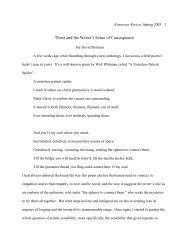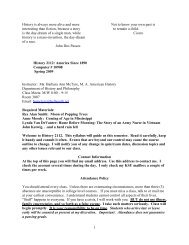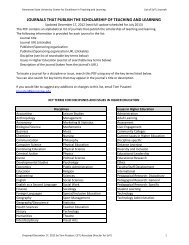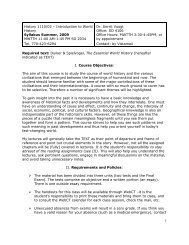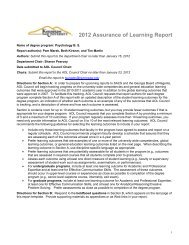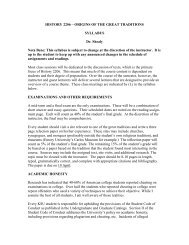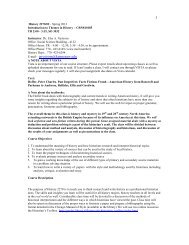Beyond Rosie: Women in World War II - Kennesaw State University
Beyond Rosie: Women in World War II - Kennesaw State University
Beyond Rosie: Women in World War II - Kennesaw State University
Create successful ePaper yourself
Turn your PDF publications into a flip-book with our unique Google optimized e-Paper software.
<strong>Beyond</strong> <strong>Rosie</strong>: <strong>Women</strong> <strong>in</strong> <strong>World</strong> <strong>War</strong> <strong>II</strong><br />
Source Sheet 28<br />
IRMA GRESE<br />
Born: October 22, 1923<br />
Birth Place: Germany<br />
Irma Grese was born <strong>in</strong>to a family loyal to the Nazi<br />
Party and left home at the early age of 15 to support the<br />
German war effort. She was unsuccessful at secur<strong>in</strong>g an<br />
apprenticeship as a nurse, and the SS placed her as a female guard at the Auschwitz<br />
concentration camp <strong>in</strong> 1943, where she quickly rose to the rank of Senior Supervisor<br />
<strong>in</strong> just one year. She became the second highest rank<strong>in</strong>g woman at the camp and was<br />
<strong>in</strong> charge of 30,000 female prisoners. She also worked at Ravensbruck and Bergen-<br />
Belsen and was later captured by the British on April 17, 1945. Grese was accused<br />
of war crimes aga<strong>in</strong>st humanity dur<strong>in</strong>g the Belsen Trials <strong>in</strong>clud<strong>in</strong>g: releas<strong>in</strong>g highly<br />
tra<strong>in</strong>ed vicious dogs to attack prisoners, and sadistic beat<strong>in</strong>gs with a braided whip. The<br />
testimony at the trail showed her as especially cruel to women with arbitrary shoot<strong>in</strong>gs,<br />
torture, beat<strong>in</strong>gs, and select<strong>in</strong>g prisoners for the gas chamber. Grese emotionally tortured<br />
the prisoners by carry<strong>in</strong>g a whip and gun, and she was reported to enjoy shoot<strong>in</strong>g<br />
prisoners <strong>in</strong> cold blood. The defiant Grese was sentenced to death by hang<strong>in</strong>g. At<br />
the age of 22, Grese was the youngest women to die judicially under English law <strong>in</strong> the<br />
20th century.<br />
Teacher’s Guide<br />
PAGE 55<br />
1. How did Grese’s upbr<strong>in</strong>g<strong>in</strong>g <strong>in</strong>fluence her to jo<strong>in</strong> the SS?<br />
2. Why do you th<strong>in</strong>k she was so vicious?<br />
3. What characteristics did she have that helped her to be promoted?<br />
4. Why was Grese so defiant even up until her death?<br />
5. What ways did she emotionally torture the prisoners?<br />
6. Read the def<strong>in</strong>itions for the terms “perpetrator” and “bystander.” Which<br />
description(s) best fits Grese? Why?




